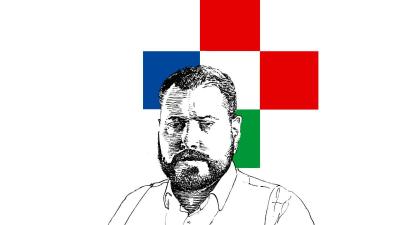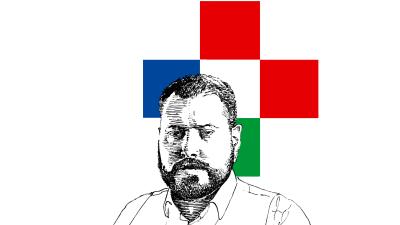The return of immigration to the heart of the debate
On 8 June, the interior ministers of the 27 EU Member States approved by a qualified majority in Brussels a migration agreement that the European Commission described as "a historic agreement reached this evening between Member States on two key texts of the Pact on Migration and Asylum".
It is an agreement that is not going down well in Central Europe, and in Hungary in particular. There, Viktor Orbán has made the fight against illegal immigration his hobbyhorse since 2015 and the historic episode of the Balkan route. The quotas for the distribution of migrants were a measure rejected by Hungary in a referendum in 2016, but the EU has been trying to impose them ever since, despite Chancellor Merkel's apparent abandonment of the project. So their return is a red line for the Hungarian government.
"Brussels is abusing its power. They want to forcibly transfer migrants to Hungary. This is unacceptable! They want to turn Hungary into an immigration country by force", declared Viktor Orbán. The pro-government daily Magyar Nemzet ran the following headline on Sunday 11 June: "Brussels would bring back the terror of mass migration": "The European Union, which has learned nothing from the failure of its migration policy, is pursuing the same unsuccessful measures as before, as shown by the new migration pact voted on Thursday". And he recalls the chaos caused by the migration crisis in 2015, when almost ten thousand people entered Hungary illegally. Then they piled up by the thousands outside Keleti station in Budapest, where the police struggled to maintain order in the face of hordes of vociferous young illegal immigrants.
Recently, Green MEP Daniel Freund, whose obsession with the Hungarian government and the migration issue is well known, admitted that Hungary in particular will not receive the funds it is owed as long as it opposes immigration. Officially, the European funds are blocked (illegally) because of Hungary’s failure to respect the rule of law, but this is clearly just a pretext for political blackmail on the Hungarian authorities.
On 22 June, the Court of Justice of the European Union (CJEU) handed down a new ruling against Hungary: according to the Court, Hungarian legislation on the right of asylum does not comply with European obligations.
"By making the possibility for certain third-country nationals or stateless persons present on Hungarian territory or at the borders of that Member State to submit an application for international protection subject to the prior lodging of a declaration of intent with a Hungarian embassy located in a third country and to the granting of a travel document enabling them to enter Hungarian territory, Hungary has failed to fulfil its obligations under the European Convention on Human Rights, Hungary has failed to fulfil its obligations under Article 6 of Directive 2013/32/EU of the European Parliament and of the Council of 26 June 2013 on common procedures for granting and withdrawing international protection."
Hungary is thus being urged to amend its legislation as soon as possible, failing which further legal action for breach of EU law could be taken by the European Commission - and we can trust the Commission to do so, seizing every opportunity to put pressure on the Hungarian government.
In any case, this is another blow for Hungary, which since 2015 and the "migrant crisis" along the Balkan route has been trying to use all possible legal means, as well as to find new ones, to stem massive illegal immigration from outside Europe. It should also be noted that this procedure, now condemned by the CJEU, was put in place following a previous ruling by the CJEU ordering the abolition of closed transit centres at the border with Serbia.
On 26 June, to mark the end of the Slovak presidency of the Visegrád Group, the prime ministers of the four Visegrád countries (Poland, the Czech Republic, Slovakia and Hungary) met in Bratislava to discuss migrant quotas.
According to Viktor Orbán, "there is a solution to migration, but the EU does not want to implement it [...] If we said that only people who had followed the procedure and received authorisation from a Member State to enter the EU would be allowed to do so, we would be out of this mess. [...] It has to be said that the whole proposal as it stands is light-hearted on the part of the Commission and, in Hungary's view, unsuitable for negotiation in this form".
New bone of contention between Hungary and Ukraine
At the beginning of June, eleven Ukrainian prisoners of war, captured by Russia, were handed over to Hungary without compensation. The reason for this? These prisoners are ethnically Hungarian, from the region of Subcarpathia (Transcarpathia from the Ukrainian point of view).
This contravenes treaties and customs concerning prisoners of war, but the operation was possible because it was carried out through the Russian Orthodox Church and the Order of Malta.
Officially, neither the Russian nor the Hungarian authorities negotiated this handover of prisoners. "It was done without the involvement of the Hungarian government," said Hungarian Foreign Minister Péter Szijjártó. "However, we are pleased that this has happened, because if even one person regains their freedom, it is good news. [...] These eleven people can move freely in Hungary, they can do what they want, they can contact whoever they want. [...] We will continue to insist on the need to achieve peace as quickly as possible, because peace would put an end to people's suffering, to the suffering of hundreds, thousands, tens of thousands of people."
Those people are Ukrainian citizens, and the diplomatic situation between Kiev and Budapest has already been tense since 2017, when Ukraine passed a law restricting free access to Hungarian-language education for Ukraine's Hungarian minority. Given also Hungary's desire to maintain trade and diplomatic relations with Russia despite the "special operation", the Ukrainian MFA did not hesitate to point the finger at Hungary. According to Dmytro Kuleba, the transfer of Ukrainian prisoners of war from Russia to Hungary "was carried out because of the political interests of the Hungarian Prime Minister [who] had to show Hungarians in Hungary and abroad that he was their only protector".
Read also
Digital Service Act: Censorship, the new value of the European Union
The entry into force of the Digital Service Act (DSA) at the end of August marks a worrying turning point in the development of the European Union and its relationship to freedom of expression.
Ferenc Almássy
Country Report: Hungary, April 2023
Between 28 and 30 April, Pope Francis travelled to Hungary on an apostolic visit. During that time, he met with Hungarian leaders, visited the faithful and immigrants, and celebrated a large open-air mass in front of the parliament.
Ferenc Almássy
Is the end of private cars coming soon?
For better or worse, the car has revolutionised our way of life, drastically changing our relationship with space. I do not intend to take stock of this revolution here and now.
Ferenc Almássy
What happened to the Hungarian cockade?
Pest, 15 March 1848, 8 a.m. Spring is approaching fast, the weather is finally mild after a long winter. In Pilvax, a café in the city centre close to Franciscan Square, six men are meeting. The discussions are heated, revolutionary fever has been brewing for several days.












Comments (0)